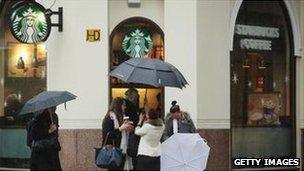Starbucks 'planning changes to tax policy'
- Published

If Starbucks introduces the changes they will be announced before Wednesday's Autumn Statement
Starbucks is planning to change the way it operates so that it will end up paying corporation tax in the UK.
BBC business editor Robert Peston cited sources close to the coffee shop firm as saying it had been stung by the criticism and was changing its ways.
Despite having almost one-third of the UK coffee shop market, Starbucks has paid corporation tax only once in the past 15 years.
Corporation tax is paid by foreign companies on profits made in the UK.
UK-based companies pay corporation tax on their taxable profits wherever they are made.
In a report published on Monday, external, Public Accounts Committee chairwoman Margaret Hodge said HM Revenue and Customs (HMRC) needed to be "more aggressive and assertive in confronting corporate tax avoidance".
She said the level of tax taken from multinational firms with large UK operations was "outrageous and an insult to British businesses and individuals who pay their fair share".
Starbucks, for example, sold nearly £400m worth of goods in the UK last year, but paid no corporation tax at all, because it transferred some of the money to a sister company in the Netherlands in the form of royalty payments, bought its coffee beans from Switzerland and paid high interest rates to borrow money from other parts of the business.
Starbucks currently pays 4.7% of its sales to a sister company in the Netherlands, and plans to continue the payment, but will no longer use it to reduce its tax liability.
HMRC said it already ensured that international companies paid the tax due "in accordance with UK tax law".
George Osborne and Chief Secretary to the Treasury Danny Alexander say tax avoiders will be pursued
If Starbucks decides to go ahead with the change it will be announced on Wednesday ahead of Chancellor George Osborne's Autumn Statement.
The Public Accounts Committee's report also criticised Amazon and Google, neither of which has paid much corporation tax.
The Treasury has announced it will provide HMRC with £77m of new money to help it track down wealthy individuals and companies who tried to avoid paying tax.
It said it expected to recoup £2bn a year as a result of the measures announced.
Downing Street also confirmed that Chancellor George Osborne planned to introduce a general anti-avoidance rule and hold talks with other G8 developed countries about clamping down on tax avoidance.
In a statement, Mr Osborne said: "The government is clear that while most taxpayers are doing their bit to help us balance the books, it is unacceptable for a minority to avoid paying their fair share, sometimes by breaking the law."
"The action... will help HMRC close in not only on those who seek to avoid or evade tax, but on the dubious 'cowboy' advisers who sell them the schemes and dodges they use to cheat the law-abiding majority."
But the Treasury said it would not obey calls to name and shame companies that abuse the system.
- Published3 December 2012
- Published4 December 2012
- Published3 December 2012
- Published2 December 2012
- Published21 November 2012
- Published20 August 2012